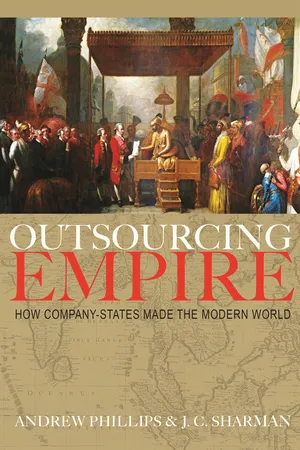CHAPTER ONE
The Rise of the Company-States
WHAT WERE THE ORIGINS of the first company-states? What explains their spectacular success as the spearhead of Western infiltration into maritime Asia? We begin by considering the conditions that made company-states possible as an institutional form. While company-states are an early modern phenomenon, their antecedents extend back to the late medieval innovation of the corporation, and more broadly to understandings of sovereignty as a bundle of divisible prerogatives, capable of delegation to a wide variety of actors. Company-states emerged from the patchwork sovereignty arrangements of medieval Europe, where rulers routinely shared power with a host of other actors, from the Church to universities, urban municipalities, and merchant guilds. Power was neither territorially exclusive, nor bounded by the strict demarcations between public and private that later emerged in Western political thought. In this sense, rulers’ authority was “heteronomous,” in contrast to the definite borders sharply delineating the domestic and foreign realms which define contemporary sovereign states. Likewise, medieval rulers commonly delegated responsibilities for coordinating long-distance trade and conquest to what we would now anachronistically call non-state actors. The historical legacy of divisible sovereignty, coupled with rich traditions of corporate trade and conquest, together enabled actors to invent the company-state.
The next section outlines the early modern catalysts for the birth of the company-states. The rise of the Habsburg Empire, roughly coinciding with the confessional polarization of the Reformation, provided the immediate impetus for the creation of the first company-states in Protestant northern Europe. For England and the Netherlands, the Habsburg Empire represented a grave strategic and ideological threat, but also an exemplar of the immense benefits that could be had from extra-European commerce and conquest. Accordingly, rulers in both countries scrambled to develop institutions that could help them maximize their wealth and power across the seas. Lacking the wherewithal necessary to finance and direct long-distance trade and conquest themselves, English and Dutch rulers opted for a hybrid alternative, one that combined the powers of a sovereign with the commercial imperatives and financial resources of a merchant enterprise. Thus the company-state was born.
Next we analyze the company-state’s institutional advantages over its chief alternatives, namely more statist forms of direct overseas expansion epitomized by the Portuguese, and ad hoc groups of merchant adventurers. The focus here is on the success of the Dutch and English East India Companies (the VOC and the EIC). Between them, these two company-states exemplified a revolutionary new form of “extended polity,” that proved more capable of projecting European sovereignty claims over oceanic distances than its institutional rivals. Company-states internalized their own protection costs; mobilized the large sums of patient capital necessary to finance long-distance commerce; innovated new ways to manage the principal-agent problems entailed in governing far-flung networks of factories and forts; and customized their diplomatic strategies to insinuate their way into Asian host polities, either as supplicants, partners, or suzerains. In combining all of these advantages within a single institution, the Dutch and English East India Companies established a potent new means to extend their commercial and political influence to the farthest ends of the earth, allowing them to access what were at the time the world’s largest and wealthiest markets. It was the spectacular success of this first wave of company-states in Asia that proved their worth, and helped catalyze widespread imitation and the ensuing replication of the company-state form in the following two centuries.
Finally, we explain why maritime Asia proved a congenial environment for the company-states, and what this meant for the subsequent course of both Western expansion and Eurasian political development.
The Medieval Antecedents to Company-States
To understand the origins of the company-state, we must first examine the mental universe of the late medieval era, as well as the more specific intellectual innovation of the corporation. Institutional vanguards of long-distance trade and conquest in the late Middle Ages also served as important precursors for the company-states.
The combination of sovereign powers with profit-seeking is the signature feature of company-states. Incongruous from today’s vantage point, this combination becomes intelligible once it is located within the larger traditions of heteronomy prevalent in late medieval Europe. Heteronomy refers to a condition in which multiple centers of power and authority overlap and intersect within the same territorial space.
The concept of heteronomy captures a European political order in which two fundamentally modern distinctions—the domestic/foreign divide and the public/private divide—were either absent or ill-defined. Political authority in Western Europe was defined by the prevalence of territorially non-exclusive forms of rule. The Church and Empire stood at the apex. Beneath were a plethora of kings, aristocrats, city-states, city-leagues, merchant guilds, and other forms. Diverse claimants asserted authority over subjects within particular issue areas, rather than aspiring to an indivisible and absolute sovereignty within a clearly demarcated territory, as is the norm today.
Besides territorially non-exclusive rule, medieval heteronomy was also marked by the absence of anything approaching today’s public/private divide. Modern conceptions of the market as an asocial and self-regulating domain of impersonal exchange between rational egoists were still centuries away. The largely feudal system instead assumed a fusion between what we would now distinguish as political and economic forms of power. Powerful actors, such as the Church, the Emperor, and kings, derived their political and military power in large part from their possession of landed wealth, and asserted extensive seigneurial power over the peasants who tilled the land. The late medieval commercial revival fueled a proliferation of new institutions, from the Hanseatic trading league in the Baltic through to monopoly merchant partnerships, to help coordinate and manage long-distance trade. These and other institutions had commerce as their core focus. But they nevertheless disposed of significant civil...




